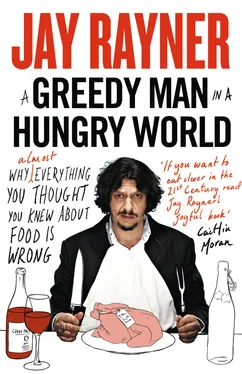The success of glossy magazines like ID and The Face , launched in the early eighties, alerted older national newspaper editors to something their younger magazine brethren had long known: there was this thing called lifestyle, and it sold copies. These newspaper supplements quickly filled up with pages of property, fashion and, of course, food. There is an assumption that there have been restaurant critics on Britain’s national newspapers for decades. It’s not so. Jonathan Meades was one of the first to be appointed, to a column on The Times , but not until 1986. Likewise, today the profession of restaurant PR is firmly established. However did we get by without them? Presumably restaurants used to just unlock the doors and wait for people to come and be fed.
The first public relations man solely dedicated to the dark arts of promoting restaurants and chefs was a former music business PR with a mop of blond hair, a neat line in patter and a taste for the hard stuff. Alan Crompton-Batt single-handedly invented the restaurant PR industry in 1987 when he began pushing a young Yorkshire-born cook with lots of black hair, piercing eyes and a talent for rock-star antics called Marco Pierre White. If Marco hadn’t existed it’s entirely possible those acres of newsprint crying out for content would have had to invent him. Indeed, it’s arguable they actually did. And quickly this spread from print to television. Where once food on TV was presented by essentially domestically orientated cooks and food writers like Fanny Craddock and Delia Smith, suddenly there was a bunch of intense-looking men in whites emerging from behind their restaurant ranges. Take Six Cooks , three series of which ran on the BBC in the mid- to late eighties, introduced the British public to a whole new set of combustible, distinctly uncosy personalities like Raymond Blanc, Nico Ladenis, Marco, and a very young Gary Rhodes.
Witness the birth of the celebrity chef. Britain’s food revolution was under way.
Britain’s supermarkets were brilliantly placed to cash in on it. A classically Thatcherite relaxation of the planning laws, combined with an abundance of capital on the markets, had enabled the biggest supermarkets to grow and prosper. They abandoned city centres where there was not enough space – many of the original self-service supermarkets were in disused cinemas, the only buildings big enough to accommodate them on the high street – for purpose-built retail sheds on the edges of residential areas. With this expansion came a greater responsiveness. If a big-name cook named a must-have ingredient on TV, the supermarkets could have it on the shelves within days.
Over the years Delia Smith has moved the market in liquid glucose, cranberries, and even something as basic as eggs. In more recent years supermarkets have rushed to stock ingredients as diverse as crab, rabbit, fresh herbs and wild mushrooms in response to recipes from the likes of Hugh Fearnley-Whittingstall, Gordon Ramsay and Nigella Lawson.
But the relationship between big-name chefs and the supermarkets goes much further. Many chefs like Rick Stein or Hugh Fearnley-Whittingstall may well make a point about the imperative to support local food producers and suppliers. Rick Stein has included at the back of some of his books long lists of contact information for these suppliers. The implication – and sometimes the overt message – is that the spread of supermarkets is something that must be resisted. And yet, increasingly, it is the very same supermarkets which are responsible for making these books best-sellers. Publishers are unembarrassed about it. They will tell you this: unless a big, glossy cookbook from a big, glossy Celeb Chef has supermarket support, it simply will not do well. As to the supermarkets, they really don’t care what message is being handed out as long as it sells. In 2004 Felicity Lawrence’s Not on the Label , which took absolutely no prisoners in explaining the evils of supermarkets, began selling so well that Tesco simply couldn’t resist. They just had to start stocking it. And so the sales increased even further.
This is the reality. It is fashionable to slag off supermarkets (even as, sheepishly, we slope off to them to do our weekly shop). It seems no discussion of British food culture can ever be complete unless it includes a complete trashing of the awfulness of these food retail leviathans. And yet, if they did not exist, if they were not such sophisticated, complex, customer-focused businesses, the food revolution of which this whole discussion is a part simply wouldn’t have happened. They have become a vital part of our national life, and have benefited us hugely.
And all of this would be a glorious and marvellous thing. We should be moved to write prose poems about our supermarket sector, compose rousing anthems, erect monuments in its honour. We should, at the very least, be hugely thankful for what we have and its impact on the modern way of life. Were it not for one thing, which is …
The spring of 2011 in Britain was marked by an unusually warm, sunny spell of blue skies and soft breezes, and in the plum orchards of Kent the white blossoms bloomed full and heavy. It promised a solid harvest with yields up on the year before. There would, as there had so often been, be lots of domestic plums to meet demand. Britain is good at growing plums. Which is not really surprising. We have been growing them for a very long time. There is evidence of plums being used in cookery during the Roman occupation. By the medieval era they were so dominant that the word ‘plum’ had become a synonym for all sorts of dried fruits, the famed plum pudding served at the Victorian Christmas a mark of its lasting popularity.
Certainly when the technologists for the major supermarkets began talking to plum farmer Peter Kedge early in 2011, he was able to reassure them that he would have lots and lots of fruit for them to buy, punnet after punnet of Marjorie’s Seedling, Reeves and Victoria, as much as 260 tonnes. The technologists monitor the levels of produce supply, to ensure the big multiples can keep their shelves stocked. ‘The message I was getting back from the supermarkets was that they could take everything we would grow,’ says Kedge, who has been a farmer of apples and plums since 1988, when he joined his wife’s family business. ‘Mind you,’ he says with a weary air, ‘they always say that.’ Even so, early in 2011 Kedge had no reason to think the harvest would be anything other than a roaring success.
And it might have been were it not for an 83-year-old woman, who was admitted to hospital in the north-west German state of Lower Saxony on 15 May, suffering from bloody diarrhoea. On Saturday 21 May she died, becoming the first of fifty people across Europe – more than forty of them in Germany – to lose their lives to a virulent strain of shiga toxin-producing E. Coli. It’s a complicated name for a vicious bug that shreds your kidneys and turns your blood poisonous. As well as the fifty deaths there would be 4,000 other serious cases across Europe, an outbreak that initiated the scientific version of a manhunt for a serial killer. Like all proper detective stories the search came complete with blind alleys, false leads and undeserving suspects. Prime among the innocent were cucumbers from Spain which, on 26 May, were fingered as the cause by German health officials. The next day a Europe-wide alert was issued calling for the withdrawal from sale of all organic Spanish cucumbers. Shortly afterwards the Robert Koch Institute, the German state body with responsibility for disease control and prevention, issued guidance warning against the consumption of not just cucumbers but also raw tomatoes and lettuce. It was a bad month for salad.
Читать дальше












